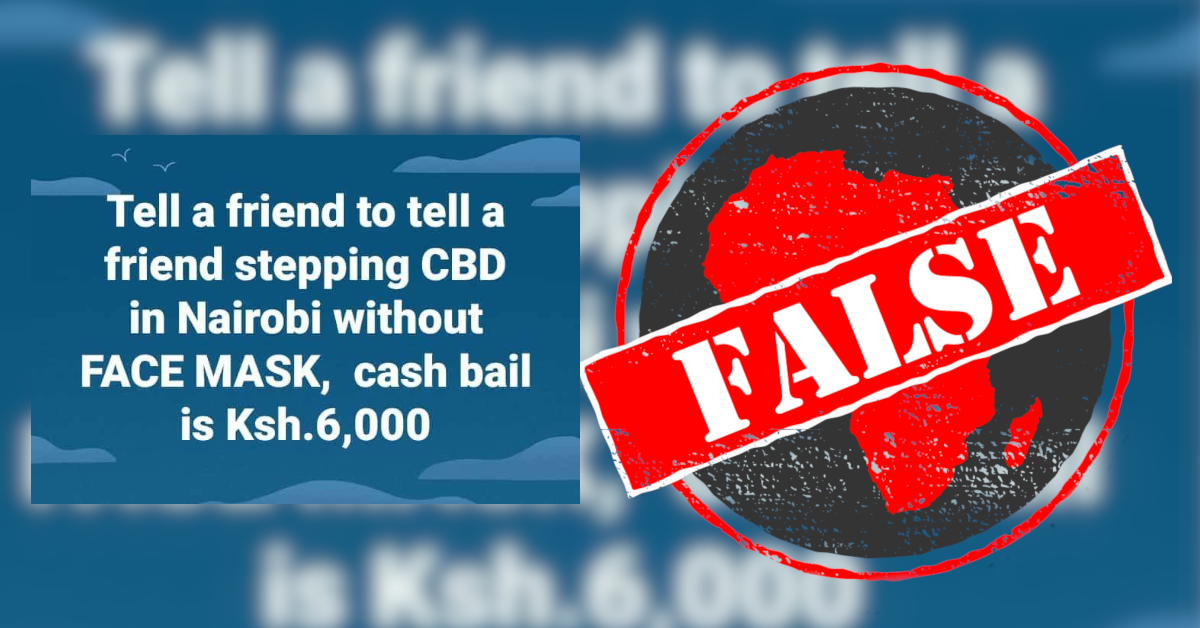“Tell a friend to tell a friend that stepping into CBD in Nairobi without a FACE MASK, cash bail is KSh6,000,” reads a message making the rounds on Facebook and WhatsApp in Kenya.
It follows a 2 April 2020 directive by Mutahi Kagwe, Kenya’s health minister, that all tuk-tuk passengers and drivers must wear masks to slow the spread of the new coronavirus. On 7 April the minister announced that “everybody must make an effort to wear a face mask in public places”.
But does anyone caught without a mask in Nairobi’s CBD face a “cash bail” of KSh6,000?

In Kenya, cash bail is issued by courts and police officers. Nairobi City county also has an inspectorate department that arrests people who break the city’s bylaws and sends them to a city court.
Lydia Gatheru, Nairobi county’s communications and protocol officer, told Africa Check the warning about KSh6,000 cash bail was false.
“That is not legit. Disregard it as fake,” she said.
Kenya’s bail and bond guidelines say bail “should be appropriate to the offence committed and take into account the personal circumstances of the accused person”. So cash bail is never set at a specific amount. It varies from case to case.
“What is reasonable will be determined by reference to the facts and circumstances prevailing in each case,” the guidelines say.
Kagwe has issued new rules to shore up the provisions of the Public Health Act as the country fights the Covid-19 pandemic.
“Users of public or private transport and public transport operators shall wear a proper mask that must cover the person's mouth and nose,” the rules prescribe.
“Every person who is in a public place during the restriction period shall use a proper face mask that must cover the person's mouth and nose.”
The rules make it an offence not to wear face masks in public places, with a maximum penalty of KSh20,000.
The rules note that “a person who commits an offence under these Rules shall, on conviction, be liable to a fine not exceeding twenty thousand shillings or to imprisonment for a period not exceeding six months or both”.
The rules apply across the country, not just in downtown Nairobi. – Grace Gichuhi
It follows a 2 April 2020 directive by Mutahi Kagwe, Kenya’s health minister, that all tuk-tuk passengers and drivers must wear masks to slow the spread of the new coronavirus. On 7 April the minister announced that “everybody must make an effort to wear a face mask in public places”.
But does anyone caught without a mask in Nairobi’s CBD face a “cash bail” of KSh6,000?

‘That is not legit. Disregard it as fake’
In Kenya, cash bail is issued by courts and police officers. Nairobi City county also has an inspectorate department that arrests people who break the city’s bylaws and sends them to a city court.
Lydia Gatheru, Nairobi county’s communications and protocol officer, told Africa Check the warning about KSh6,000 cash bail was false.
“That is not legit. Disregard it as fake,” she said.
Kenya’s bail and bond guidelines say bail “should be appropriate to the offence committed and take into account the personal circumstances of the accused person”. So cash bail is never set at a specific amount. It varies from case to case.
“What is reasonable will be determined by reference to the facts and circumstances prevailing in each case,” the guidelines say.
Maximum fine of KSh20,000, six months in jail
Kagwe has issued new rules to shore up the provisions of the Public Health Act as the country fights the Covid-19 pandemic.
“Users of public or private transport and public transport operators shall wear a proper mask that must cover the person's mouth and nose,” the rules prescribe.
“Every person who is in a public place during the restriction period shall use a proper face mask that must cover the person's mouth and nose.”
The rules make it an offence not to wear face masks in public places, with a maximum penalty of KSh20,000.
The rules note that “a person who commits an offence under these Rules shall, on conviction, be liable to a fine not exceeding twenty thousand shillings or to imprisonment for a period not exceeding six months or both”.
The rules apply across the country, not just in downtown Nairobi. – Grace Gichuhi
Republish our content for free
For publishers: what to do if your post is rated false
A fact-checker has rated your Facebook or Instagram post as “false”, “altered”, “partly false” or “missing context”. This could have serious consequences. What do you do?
Click on our guide for the steps you should follow.
Publishers guideAfrica Check teams up with Facebook
Africa Check is a partner in Meta's third-party fact-checking programme to help stop the spread of false information on social media.
The content we rate as “false” will be downgraded on Facebook and Instagram. This means fewer people will see it.
You can also help identify false information on Facebook. This guide explains how.





Add new comment